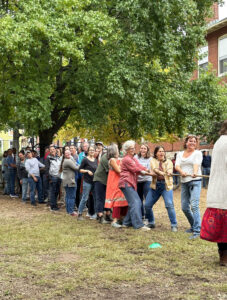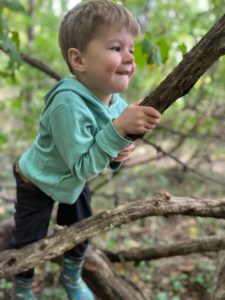Why is Waldorf Education the fastest-growing educational movement?
A personal perspective.
Waldorf Education is reported to be the fastest-growing non-sectarian, independent educational movement in the world. According to data from 2022, Waldorf World List there are 1,270 Waldorf and Rudolph Steiner Schools in 80 countries and 1,928 Waldorf Kindergartens in more than 70 countries. This global expansion shows that parents all over the world are seeking a holistic education for their children.
Thirteen years ago, as parents of a two-year-old and 11-month-old, we began researching schools for our oldest child. Unfamiliar with Waldorf education, we found Susquehanna Waldorf School’s website and decided to attend an Open House. On the day of the visit, my toddler refused to wear clothes, so we arrived late. I entered the beautifully historic school feeling embarrassed and weary, carrying a reluctant two-year-old. I’d missed the tour, but a kindergarten teacher, Ms. Wendy, warmly welcomed us. My son promptly took off his shoes and began exploring the classroom while I worried about how inappropriate this might be. Ms. Wendy crouched down and spoke to my son in a beautiful way, and he was captivated. She understood him, she welcomed us, and I immediately knew we’d found a rare gem of a school. We never made it past the kindergarten classroom that day, but we had all the information we needed— this was a place of beauty, joy, respect, and acceptance with teachers who truly understood children’s needs.
Now, years later, as SWS’ Admissions Coordinator, I have the privilege of introducing families to SWS and Waldorf Education. Many of these families arrive seeking an alternative to public or other independent school options. They are often captivated by the hallmarks of the school— the joyfully balanced, holistic approach to education, the warmth of the community, and the beauty of the physical space. Our new families are generally seeking three things that Waldorf education uniquely provides: community, connection to nature, and a balanced curriculum rooted in a knowledge of child development.
 1) Community
1) Community
Many prospective families have children born just prior to or during the pandemic. These children have often experienced isolated early years, and parents are eager to support their social-emotional development. Parents are amazed when they witness SWS’s play-based early childhood classrooms, lively with snack preparation, artistic endeavors, and deep imaginative play. Interactions with peers are opportunities to experience cooperation, conflict resolution, empathy, and redemption— keys to healthy social development. Loving teachers and assistants support children as they navigate the sometimes bumpy efforts of working within a community.
Parenting can be isolating and confusing. Many parents seek not only to support their child’s social development but also a desire to find a place where the whole family becomes part of a community. The SWS parent community and parent education offer a warm embrace and connection for families seeking a like-minded approach to parenting. Alum parent and Board President Dave Knapp reflects that through his involvement in the SWS community, “I learned at least as much as my children did, I became a better parent, a better person… know that this school is going to change your life. It’s changed mine.”
 2) Connection to Nature
2) Connection to Nature
Research emphasizes the importance of getting outdoors, especially for young children. Being in nature supports a child’s social-emotional regulation, mental health, intellectual development, and increases motor skill development. The Child Mind Institute explains why outdoor play is so important for children, “Spending time in nature can build their confidence. There’s a lot less structure than most types of indoor play, and they can choose how they interact with the nature around them. This gives them practice managing their own actions and encourages creativity and imagination.”
At SWS, our emphasis on physical movement throughout the day is becoming more and more unique. Our students delight in going outdoors for recess or nature walks twice a day all the way through 8th grade, regardless of the weather. As Waldorf teachers love to share, “There’s no bad weather with the right gear.” Our students experience the joy of the changing seasons through direct observation. As one Kindergarten parent, Laura K. shared, “We know we would’ve wanted it for ourselves, so it’s a gift to our children.”
 3) Curriculum
3) Curriculum
Many families find SWS after recognizing that their local public or independent schools haven’t been a fit for their children. Technology is taking the place of experiential, hands-on learning and parents are noticing the detrimental effect it has on their children. They notice their child is anxious and overwhelmed by large class sizes and no longer enjoys school—many share the “spark” of learning has gone out. The Waldorf curriculum is infused with art, music, and movement and children learn traditional concepts in age-appropriate and imaginative ways, making learning engaging at all levels. The Waldorf curriculum encourages the development of skills and the capacity for learning. The whole child (“head, heart, hands”) is considered in each level of development, providing a balanced foundation for lifelong learning. SWS students graduate not only with the skills needed for high school but also an intrinsic motivation and excitement for learning. New parent, Sherrie M. shares the world of difference since coming to SWS, “Prior to coming our older daughter did not like school and did not enjoy her experience in public school. Coming to this school, now she doesn’t like weekends anymore because she wants to be at school! That’s a complete 180. She loves the community, her teacher, her classmates. We’ve seen such growth in her reading, math has been explosive for her— the uncovering of what’s underneath represents such growth.”
Many years ago, we began our family’s journey at SWS, enrolling in the Parent-Child class. We weren’t sure if this would be a long-term educational fit and had no idea what lay ahead. Through the steadfast support of teachers and fellow parents, we began to learn about the truly unique Waldorf curriculum and have seen our three children thrive—growing and developing into strong artists, musicians, scholars, and athletes. I wanted my children to love learning, to be curious, and to be stretched. Now, with the perspective of 13 years, one graduate and another soon to be, I couldn’t imagine that my children could get as rich an education anywhere else.
